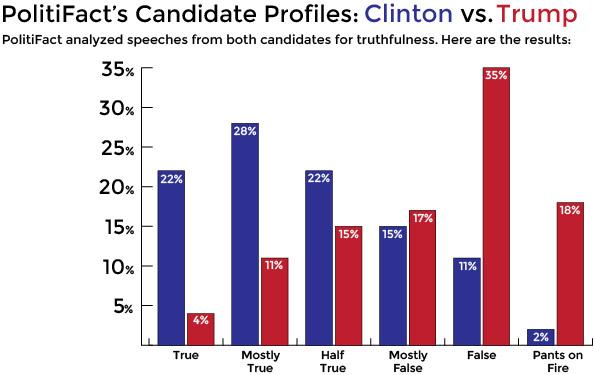Last week, in the midst of the Donald Trump birtherism flip-flop, Gallup released its annual poll titled, “Americans’ Trust in the Mass Media.” Unsurprisingly, yet still saddening, only 32 percent of Americans said they have a “great deal” or “fair amount” of trust in the mass media. This is the lowest recorded number in the history of Gallup’s 44-year-old questionnaire, and the largest yearly drop since 2004.
This decrease was largely driven by Republicans, whose trust numbers decreased from 32 percent to an abysmal 14 percent, according to the poll. It’s fair to make the assumption that the vicious reciprocal cycle between Trump and the media is to blame for deep Republican mistrust. The media obsesses over Trump, and Trump obsesses over the media.
This is not to say that the decline of mass media trustworthiness lies on the shoulders of The Donald. The rise of the internet and the prominence of social media has increased the quantity of information, but has limited the quality.
“The click economy has driven even traditional, mainstream media outlets to focus on quick hits and ‘viral’ stories, even if they have little truth to them,” Mathew Ingram of Fortune Magazine wrote of this predicament. “And even if those stories are later corrected, only a tiny number of people will see or share the correction.”
Even if trust in mass media is scarce, it seems to be in line with the declining confidence in many other institutions of this day and age, as solidified by a separate Gallup poll entitled “Confidence in Institutions.” The poll, performed in June, found that less than 10 percent of people have a “great deal” or “quite a lot” of confidence in Congress, 18 percent of people have a great deal or quite a lot of confidence in big business and 27 percent of people have a great deal or quite a lot of confidence in banks.
These statistics make Clinton and Trump’s trust numbers seem adequate, though they clearly are not. According to a CNN and ORC International poll, 50 percent of respondents said they thought Trump is more honest and trustworthy candidate compared to Clinton, who received 35 percent of respondents’ votes, as of Sept. 4. I shivered when I read that statistic, not just because I have a Hillary for President 2016 poster in my dorm room, but because 50 percent of respondents are wrong about the facts, while 15 percent don’t know them and responded “neither” are trustworthy. How so? Take a look at the graph of PolitiFact’s files on Clinton and Trump.
So while distrust in the media can be attributed to the presidential race, the rise of the internet and social media and a lack of overall trust in this modern era, the media’s main issue is its obsession with profits — especially that of television news networks.
Leslie Moonves, president of CBS, said this election “may not be good for America, but it’s damn good for CBS.” Mass media as a whole has failed in its role as the fourth branch of government by focusing more on ratings than issues. I remember turning on CNN and MSNBC and watching the “yugely” bombastic orange man, who is also known as Trump, shouting at a crowd filled with “basket of deplorables,” according to Hillary.
Distrust in the media should not be this prominent considering the continued dedication to high-quality investigative journalism during this election, but the mass media’s flaws have overcome its ability to act as the arbiter of truth.
























































































































